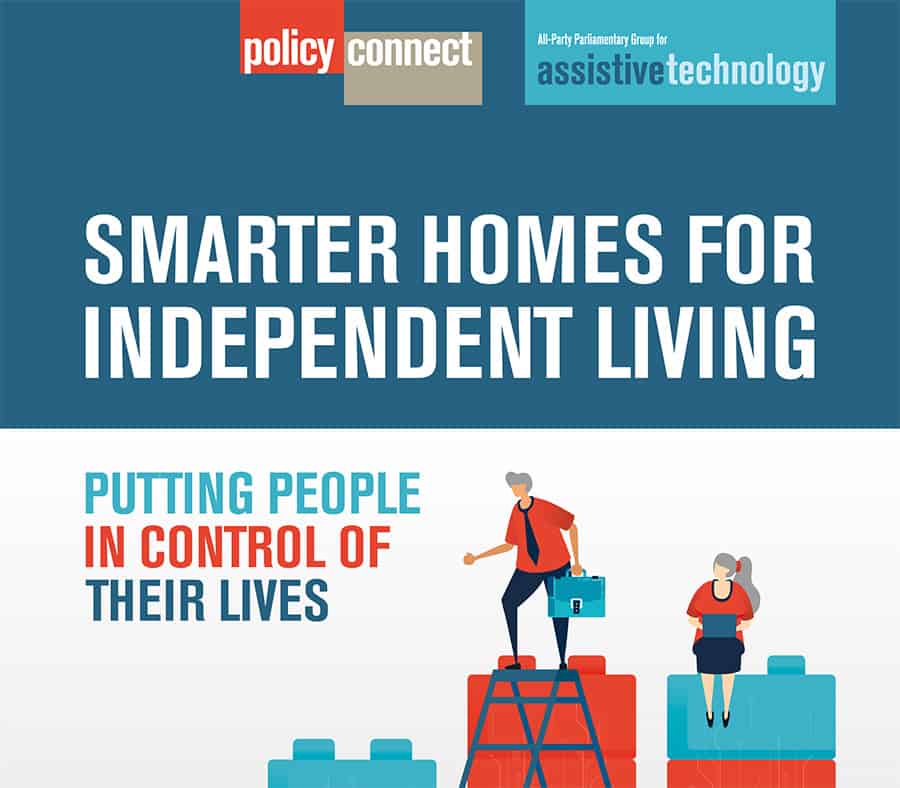Report suggests that government creates a new grant to boost access to life-enhancing assistive tech

A new report has been launched that explains the many ways that smart home technology can enhance independent living, and it details how health and social care services need to be reformed with technology at their centre to enhance people’s quality of life.
The report – ‘Smarter Homes for Independent Living: Putting people in control of their lives’ – comes from cross-party thinktank Policy Connect and the All-Party Parliamentary Group for Assistive Technology (APPGAT) as the final stage of their Commission on Smart Homes and Independent Living.
It draws on the combined expertise of healthcare practitioners, the scientific community, policymakers, business and the third sector, to develop a forward-looking set of recommendations to government, local authorities, the health and social care sector, and technology companies.
The report explains how smart home technology, which is now often mainstream and widely available such as devices like Amazon Alexa, presents a huge opportunity for disabled and older people to take more control of their lives and gain greater independence. For example, people with limited mobility could use smart speakers to turn on lights or a TV.
However, the report underlines that unless services and technologies are designed in a way that includes older and disabled people, technology could become a barrier pushing people further away from an increasingly digitalised society.
This is a sentiment echoed by Richard Purcell, Director of specialist assistive technology solutions provider CareScribe, who recently said that creating assistive technology for the masses is a “mistake”. He believes that such technologies and services should be designed for those who rely on them the most to ensure assistive technologies continue to be effective.
Commission Chair Sir Paul Carter CBE and the report author Clive Gilbert discuss good practice case studies of the impact smart home technology can have.
Importantly, the report shares tangible actions for the UK Government and industry to help people take full advantage of assistive technology.
The report’s key recommendation is for the government to create an Independent Living Technology Grant to boost access to life-enhancing technologies. This grant would overcome the inflexibilities of existing public funding sources and help disabled and older people invest in, and acquire, consumer products as well as receive any support they might need to use and maintain them.
Sir Paul Carter CBE commented: “Many disabled and older people have not benefited from the dramatic growth of the consumer smart home market in recent years. The lessons of the pandemic and the vision for adult social care set out in the White Paper present an opportunity for ministers to ride the current wave of social and technological change and renew the government’s commitment to protect disabled and older people’s right to live the lives they deserve and improve their quality of life. Our proposals set out how they can seize that opportunity.”
When implemented correctly, smart home technology works alongside people’s care networks rather than replacing social contact. It can also reduce financial pressures on the NHS and the social care system, the report argues.
Clive said: “Our recommendations will help millions of disabled and older people lead more fulfilling lives by putting their needs and aspirations at the centre of technology design and care services. Independent living has long been a key tenet of the disability rights movement. With the ageing society, this demand is being embraced by a growing section of society.
“With appropriate support from carers, family members and friends, smart home technology promises to give people more choice and control in their lives. To achieve this, we must reform the way technology is used in health and social care services. The technology market must also be made to work better for disabled and older consumers.”
Bournemouth University and Coventry University sponsored the report, and a professor from each university sat on the steering group and gave evidence to APPGAT’s sessions.
Professor Lee-Ann Fenge, Professor of Social Care at Bournemouth University, explained: “Independent living and smart home technology should enhance wellbeing and social inclusion to support people to live their best lives. As part of this it is important that older and disabled people are involved in decision making and the development of high-quality evidence of the impact of technology on their lived experience.
“This requires a commitment to co-producing new solutions based on the peoples’ experiences and a need to respond to issues of access and digital exclusion.
“All disabled and older people should have equal access to person-centred smart technology to enable them to live the lives they wish to live. Within a challenging national context of social care provision, it is essential that independent living is prioritised within sustainable funding and resource structures, to support the independence, health and wellbeing of all disabled and older citizens.”
Professor Sally Dibb, Coventry University’s Centre for Business in Society, added: “The holistic approach taken by Policy Connect in examining this complex issue, has enabled the joined-up thinking necessary to bring about much-needed change. The emphasis placed on the needs of users and carers who can benefit from these technologies is to be commended – resulting in findings that reflect the needs of those who are most important. I particularly welcome the recommendations to improve access to innovative assistive technologies for older people and those with disabilities.
“Every member of our population has the right to live independently and well. The Smart Homes and Independent Living Commission recommendations are an important step towards achieving this goal.”
Read the full report here.

